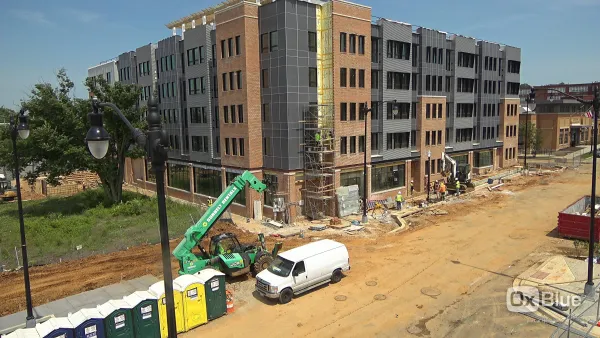The act of running and building our homes is responsible for almost half of the U.S.'s carbon footprint. GOOD Magazine asks, so why are we so obsessed with making cars sustainable instead of homes?
"We're hardwired to address the smaller problems that we can see, rather than the big ones that we can't imagine. There's no better-or more important-example of that problem than the current debate over energy use.
I'd wager that if you polled even well-informed citizens, they'd rank fuel efficiency as the number one problem we face, in trying to reduce carbon emissions. And I'd bet that, if in this very column you're reading, I went on to talk about all the ways cars are destructive to the environment, not a single person would respond: But how important is that, really?
But the plain fact, as Mother Jones points out, is that buildings, in the electricity they use to run and the materials they require to build, are responsible for nearly half of our nation's carbon footprint. Transportation? Twenty-seven percent. So it's safe to say that while transportation is crucial, we can't solve our carbon problem if we fail to address the energy we use in our buildings.
And yet the fuel efficiency of cars dominates headlines and op-eds, while discussions of carbon-neutral electricity-when they happen-treat it more like something that's nice to have rather than the single biggest problem at hand. Why is that?"
FULL STORY: Home Improvement

Planetizen Federal Action Tracker
A weekly monitor of how Trump’s orders and actions are impacting planners and planning in America.

Restaurant Patios Were a Pandemic Win — Why Were They so Hard to Keep?
Social distancing requirements and changes in travel patterns prompted cities to pilot new uses for street and sidewalk space. Then it got complicated.

Map: Where Senate Republicans Want to Sell Your Public Lands
For public land advocates, the Senate Republicans’ proposal to sell millions of acres of public land in the West is “the biggest fight of their careers.”

Maui's Vacation Rental Debate Turns Ugly
Verbal attacks, misinformation campaigns and fistfights plague a high-stakes debate to convert thousands of vacation rentals into long-term housing.

San Francisco Suspends Traffic Calming Amidst Record Deaths
Citing “a challenging fiscal landscape,” the city will cease the program on the heels of 42 traffic deaths, including 24 pedestrians.

California Homeless Arrests, Citations Spike After Ruling
An investigation reveals that anti-homeless actions increased up to 500% after Grants Pass v. Johnson — even in cities claiming no policy change.
Urban Design for Planners 1: Software Tools
This six-course series explores essential urban design concepts using open source software and equips planners with the tools they need to participate fully in the urban design process.
Planning for Universal Design
Learn the tools for implementing Universal Design in planning regulations.
Heyer Gruel & Associates PA
JM Goldson LLC
Custer County Colorado
City of Camden Redevelopment Agency
City of Astoria
Transportation Research & Education Center (TREC) at Portland State University
Camden Redevelopment Agency
City of Claremont
Municipality of Princeton (NJ)





























